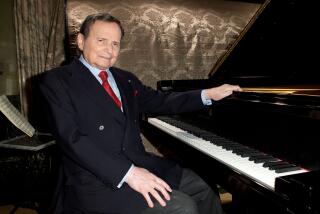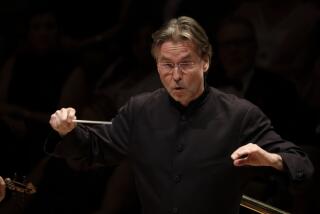Cultural Exchange: The diplomatic view of classical music
Two recent and seemingly unrelated events, the release of 250,000 unredacted State Department cables written between 1966 and 2011 via WikiLeaks and the pro-Palestinian protests at the Israel Philharmonic concert in London, got us thinking: How closely entwined are politics and classical music in diplomatic circles?
A few weeks ago WikiLeaks published cables sent by American diplomats who were reporting back to the government on events and people of interest to the United States. The reports are incredibly detailed (we can now confirm that, yes, the president of Turkmenistan did get two extra pineapples on his fruit plate in 1997), which can make for a tedious read.
Put a few classical music keywords in the search box, however, and nuclear-weapon panic gives way to the curious mixture of social chess, pageantry theater and “Fawlty Towers” that is cultural diplomacy.
If the reporting diplomat happens to be a good writer, the extra detail creates a vivid and at times extremely entertaining picture.
Classical music is mentioned most often when the diplomat is discussing an individual’s openness to Western culture, his level of sophistication and the cultural health of a region in transition.
It is surprising to discover how classical music performances are used to introduce foreign audiences to American culture. An explanation comes from pianist Michael Sheppard, who won a classical fellowship with the American Pianists Assn. in 2003. The prize included a State Department-sponsored tour of Sri Lanka, Bahrain and Syria, which led to Sheppard’s name showing up in a cable.
“The State Department probably uses classical music because there aren’t words attached it,” he said. “It’s hard to be inflammatory when you’re just playing piano pieces.”
Reading the cables, it seems these concerts are more about what the music represents than the performance. Explained Sheppard, “Music can be a propaganda tool for sure, but I don’t think the State Department is thinking, ‘Let’s use music to get [the audience] to like the U.S.’ I’m not trying to push a political agenda at all. Music doesn’t have anything to do with the little boundaries that we make.”
What follows are excerpts selected to give a glimpse into diplomatic life and the various ways classical music fits in.
Musician in high-ranking post, Belmopan, Belize, 2008
“Belize’s new Attorney General and Foreign Minister Wilfred Elrington plays the tuba, as did his father. Other siblings and his children also play instruments as well. He described his weekly band practice as something he lives for.”
Why we do cultural diplomacy, Colombo, Sri Lanka, 2003
“Here, as in many other places around the world, classical music enjoys the patronage of Sri Lanka’s most influential citizens. In a bilateral conversation that is inevitably driven by the nuts and bolts of policy, [Michael] Sheppard’s appearances brought boost and dimension to our message. The U.S. is not just a world power, Sheppard’s music illustrated. It’s also a civilization. Clearly, the Department should be sponsoring more — not fewer — programs like this.”
Classical win, Kuwait, 2004
“The head of Shiite clerics in Kuwait, Mohammed Al-Mohri stated that ‘frivolous music’ such as jazz is ‘haram,’ or forbidden, but that classical music ‘such as Beethoven’s Sixth Symphony’ is acceptable.”
Universal language, the Vatican, 2004
“The Holy See is committed to a respectful dialogue with Islam. As a reflection of this commitment, the Vatican will host a reconciliation concert featuring the three faiths of Abraham. The Pittsburgh Symphony will play Mahler’s 2nd Symphony ‘Resurrection’ with Muslim choir and Jewish conductor.”
Everyone’s a critic, Ashgabat, Turkmenistan, 2008
In reference to a February 2007 concert given on the first anniversary of President Gurbanguly Berdimuhamedov’s inauguration:
“The concert hall was packed to the rafters with Ashgabat’s elite and a fair number of students. The concert program was strictly symphonic, and included no ‘traditional culture.’ The orchestra itself was surprisingly proficient, equivalent to any second-tier orchestra in the West.”
Everyone’s a critic II, Bangui, Central African Republic, 2009
“[American pianist William] Phemister’s performance included classical works, from composers such as Bach and Brahms, and American music from several eras, including several pieces by ragtime composer Scott Joplin. His technical skills, especially his outstanding dynamics, coupled with interesting and witty commentary assured the full attention from the various audiences, many of whom had never before heard a live performance of classical or American music. During the Joplin selections, every foot in the room was tapping.”
String quartets for seniors, Tirana, Albania, 2008
“Teenagers had the opportunity to dance with professional ballerinas in the main city boulevard, while other more senior audiences could relax to the sounds of a string quartet.
“If you would have happened to cross [Mayor] Edi Rama’s path that night, he would have approached you with outstretched arms. But not to worry, you would have only received a bear hug — not because Rama was feeling particularly loving, but because of the ‘Free Hugs’ campaign.”
And the audience loved it, Bishkek, Kyrgyzstan, 2007
“The cultural program began with a modern dance number that culminated with the raising of a yurt. It also included ballet, hip-hop, gymnastics, and children’s dances.
“The musical performances all appeared to be lip-synched and included: a Russian love song performed by three ethnic Kyrgyz gentlemen in white leisure suits; a number of patriotic songs, including ‘Kyrgyzstan’ mouthed by an ethnic Russian in Kyrgyz military fatigues, and a violin performance so energetic that the strings all snapped, which was virtually unnoticeable due to the canned Vivaldi pouring out of the loudspeakers.
“Every performance was met with enthusiasm by a supportive audience.”
A cello shortage, Ashgabat, Turkmenistan, 2007
“The German ambassador mentioned that Turkmenistan had significantly changed the repertoire for the concert in Ashgabat. No cellos were available for the concert, government officials said, because all the cellos had gone to Turkmenbashy.”
More to Read
The biggest entertainment stories
Get our big stories about Hollywood, film, television, music, arts, culture and more right in your inbox as soon as they publish.
You may occasionally receive promotional content from the Los Angeles Times.






